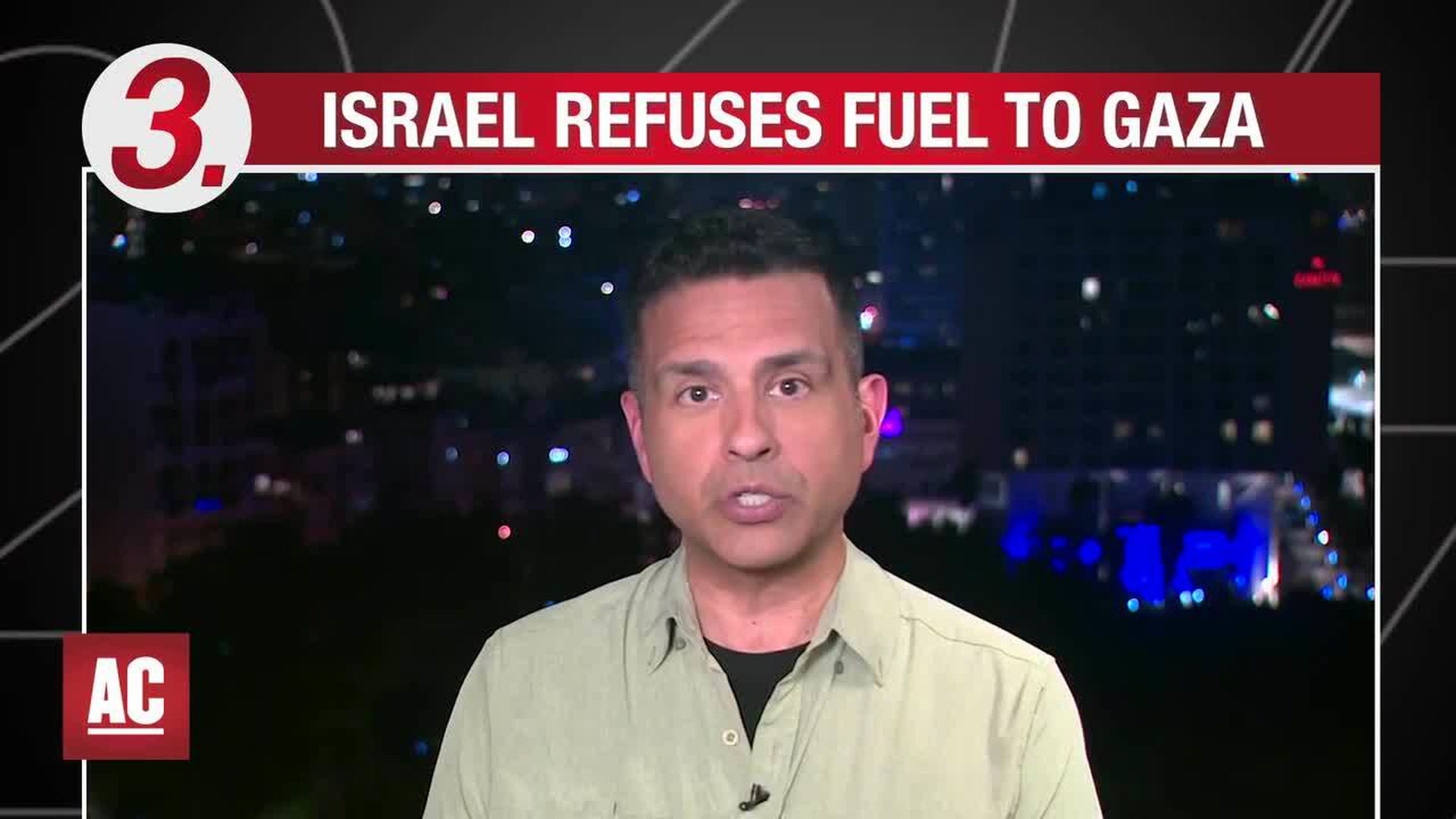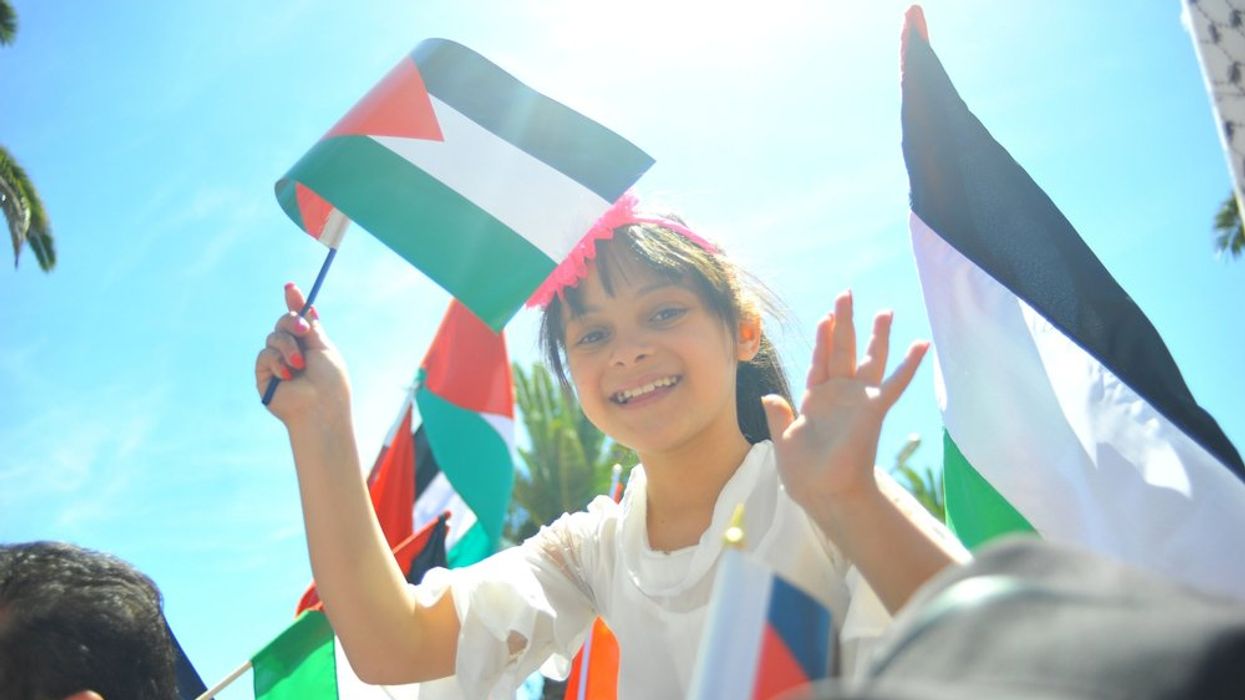As the civilian death toll in Gaza climbs, many abroad are wondering what they can do to help the innocent Palestinian civilians trapped in the territory.
The first idea at the top of most lists is the obvious: donate. Unfortunately, even the largest donation has little chance of actually reaching civilians in Gaza right now, as the territory has been under a blockade by Israel for over 15 years, and Israel is currently not allowing aid to enter through Gaza's shared border with Egypt, the Rafah crossing.
Israel has also cut off Gaza's access to food, water, fuel, electricity, and telecommunications against international law. They have refused to let in emergency fuel, making hospitals unable to care for the over 1,000 patients receiving kidney dialysis treatment in Gaza, as well as 130 premature babies in incubators.
Israel refuses to fuel Gaza

The United Nations was forced to drastically cut aid efforts in the region as of last week, which were already less than half of 1 percent – or one two-hundredth – of the amount of aid Gaza ordinarily receives.
Children account for 40 percent of the over 8,500 Palestinians who have been killed in the past three weeks. According to Jason Lee, Save the Children’s country director for the occupied Palestinian territory, "a ceasefire is the only way to ensure their safety."
The United States was one of the few nations at a recent UN meeting that voted alongside Israel against a ceasefire. While donating to humanitarian organizations may not sway U.S. leaders, contacting them directly just might.
Here are a few ways you can help civilians in Gaza that could have a bigger impact than simply opening your wallet.
1. Contact your local representative
Are you disappointed in U.S. leaders for voting against a ceasefire? Do you want your district's representatives to push for a ceasefire in Congress? Do you want your local officials to refuse to send more weapons to Israel? Tell them!
One of our greatest freedoms in the U.S. is our right to free speech, or in other words, our right to complain. If you're unhappy with how your local leaders are handling the humanitarian crisis in Gaza, you can tell them that directly to their face (or at least, directly to their office.)
You can look up your representatives here by entering your ZIP code, which will give you their office's email and phone contact information. They may be more inclined to take your message seriously if you remain polite, but simply expressing your disappointment as a voter (especially before an election) can go a long way.
And for those curious about who they can support for re-election, here are the 18 representatives who risked their careers to vote in favor of a ceasefire.
2. Support the Boycott, Divestment, and Sanctions movement
Also known as the BDS movement, Boycott, Divestment, and Sanctions is a Palestinian-led movement promoting boycotts, divestments, and economic sanctions against Israel for their violations of international law. In the simplest terms, these economic protests target companies who take money from, or give money to Israel.
While individuals avoiding supporting these companies is never unwelcome, there will be more of an impact if you can convince a larger organization to participate. This can include your company, church, union, nonprofit, or academic institution.
You can check with BDS organizations in your country for the brands being targeted in your community. Right now, the organization is encouraging widespread boycotts of Puma, HP, Siemens, AXA, SodaStream, Sabra, Ahava, Israeli Fruits and Vegetables, Domino's Pizza, McDonald's, Papa John's, Pizza Hut, and Burger King. While the movement has not explicitly called for it yet, members have also begun boycotting Starbucks and Disney.
3. Donate locally
While there are internationally-recognized organizations working abroad to deliver aid to Palestinians, such as the UNRWA (the UN agency which has been forced to stall its efforts) and the Palestinian Red Crescent, there are U.S.-based organizations that can help Palestinian or Muslim Americans in your community.
The Council on American-Islamic Relations is the nation's largest Muslim civil rights and advocacy organization, which works on behalf of Muslims as well as others who have been discriminated against, or the victims of hate crimes. Their communications department works with media companies to encourage the positive portrayal of Muslims and combat stereotypes, and the organization frequently works with members of Congress on legislation supporting the community.
The FBI has warned that hate crimes against Jewish and Muslim communities alike have skyrocketed since the Oct. 7 Hamas attacks. Jewish Voice For Peace is a group that combats anti-Semitism as well as advocates for Palestinian liberation. They were responsible for the recent protests at Grand Central Station in New York City, where thousands of Jewish people and their allies risked mass arrest to call for a ceasefire.
If you're looking for an organization whose work directly involves Palestinian children, the Palestine Children's Relief Fund is a U.S.-based agency that works to deliver humanitarian aid to Gaza. They contribute life-saving medical supplies for hospitals, as well as food and formula. The PCRF cautioned recently that they are currently unable to deliver aid in Gaza, as all agencies are, but the funds will still go to their emergency teams, which include doctors who will immediately resume their medical missions as soon as they are allowed.
4. Continue speaking out
Though it may sound cliché, public opinion can affect policy. For the first time in history, Democrats’ sympathies lie more with Palestine than Israel, which could shift even further towards Palestine as Israel continues its human rights abuses.
In some European countries, where there have been restrictions placed on pro-Palestinian demonstrations, people still turned out in the hundreds of thousands to call for an end to apartheid, using the time-honored tactic of "you can't arrest all of us."
While protests are often somewhat spontaneous, keeping an eye on your local social media groups and news stations can help you know when demonstrations are occurring near you. Even voicing your opinions online can shift discourse and combat against propaganda, and while it may not change minds directly, it can let people know that discrimination and defense of genocide are not tolerated.
- Palestinians Fear Another Exodus Is on the Horizon: 'They Would Rather Die in Gaza Than Move' ›
- UN Forced to Halt Aid Operations in Gaza as Israel Denies Palestinian Civilians Fuel ›
- Palestinians Lament Israeli Airstrikes Endangering Civilians in Gaza: 'We're Not Hamas' ›
- UN Sounds Alarm on 'Risk of Genocide' Against Palestinians ›
- Queering the Map in Gaza: LGBTQ+ Palestinians Pay Tribute to Deceased Loved Ones ›
- US Warns Israel Amid Gaza Carnage It Doesn’t Have Long Before Support Erodes ›
- Pro-Palestine Protests Erupt Globally, Call For Ceasefire ›
- Rashida Tlaib Condemns Biden 'Supporting Genocide' in Gaza ›
- Monday's Top Stories: Pro-Palestine Protests, Arab Americans ›
- UNICEF Defends Gaza Death Toll Accuracy After Biden Casts Doubt ›
- 100 Congressional Staffers Walk Out in Support of Ceasefire ›
- Israeli Official Caught Lying, Claims Gazans 'Fake Injuries' ›
- Friday's Top Stories: Remembering Veterans, Gaza Workers ›
- What Is 'Pallywood'? Conspiracy Theory Slanders Palestinians ›
- Gaza Hospitals Forced to Halt Operations by Israeli Blockade ›
- United Nations Honors Aid Workers Killed in Gaza ›
- Greta Thunberg Attacked at Climate Change Protest For Showing Solidarity With Palestinians ›
- Monday's Top Stories: Biden & Latinos, Dwanye Johnson, Rafah ›
- Biden Sued For ‘Complicity’ in Israel’s ‘Genocide’ in Gaza ›
- Israel's Attacks on Hospitals Must Be 'Investigated as War Crimes:' Human Rights Watch ›
- 400 Biden Staff Members Sign Letter Calling For Ceasefire ›
- Israel Can't Claim a 'Right of Self-Defense:' UN Rapporteur ›
- How Many More Palestinians Must Die? This Republican Says 'All of Them' ›
- Pastor Who Said Hitler Was Sent by God Featured at March For Israel ›
- Becca Balint Is the First Jewish Rep to Call For a Ceasefire ›
- Disabled Palestinians Struggle to Survive in Gaza ›
- Hostage Deal Between Israel and Hamas Could Come as Soon as Tuesday ›
- Israel and Hamas Reach Hostage Release Deal, Four-Day Truce ›
- Jenna Ortega Exits 'Scream 7' After Melissa Barrera's Firing ›
- 3 Palestinian College Students Shot in 'Hate-Motivated Crime' ›
- Monday's Top Stories: Truce Extended, Palestinian Kids Free ›
- Over 350 Children Detained by Israel Without Trial — Why? ›
- Students Are Lawyering Up in the Wake of the Israel-Hamas War ›
- Israel Ramps Up Arrests in the West Bank Amid Truce in Gaza ›
- UN Reaffirms Solidarity With Palestine on International Day ›
- Thursday's Top Stories: COP28, West Bank, Henry Kissinger ›
- Israel Knew of Hamas' Attack Plans Over a Year Ago: Report ›
- Friday's Top Stories: Coast Guard Coverup, Survival in Gaza ›
- None ›
- Wednesday's Top Stories: Military Block Lifted, Norman Lear ›
- Israeli Hostages Express Fury at Netanyahu in Leaked Audio ›
- UN Chief Invokes Rare Power to Call For a Ceasefire in Gaza ›
- Disease Could Kill More in Gaza Than Bombs: UN ›
- Biden Administration Staff Call For Ceasefire at Vigil Outside White House ›
- I Criticized the War in Gaza. Then I Was Fired From My Job as Santa. ›
- More than 10 children are losing legs in Gaza every day: report ›
- Israel Condemned For Raid on Gaza's Largest Hospital ›
- Friday's Top Stories: Ceasefire Protests, APEC, Paul Pelosi ›



















































